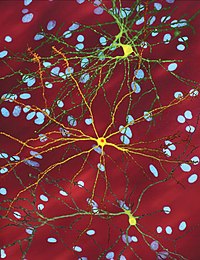
Photo from wikipedia
Vulvodynia is the experience of idiopathic pain characterized by burning, soreness, or throbbing in the external female genitalia or vulva and is estimated to be experienced by 4–16% of the… Click to show full abstract
Vulvodynia is the experience of idiopathic pain characterized by burning, soreness, or throbbing in the external female genitalia or vulva and is estimated to be experienced by 4–16% of the female population, yet only half of women seek help regarding their symptoms. Of the women who do seek help, only around 2% obtain a diagnosis. Therefore, the aim of the current study was to explore the experiences of women with vulvodynia on their journey toward diagnosis, by using semi-structured interviews and an interpretative phenomenological analysis (IPA) methodology. Eight women were interviewed, and their experiences were analyzed and interpreted into three master themes, each with constituent sub-themes: (1) The Journey Is a Battle, (2) “What Is Vulvodynia?”: Ambivalence Toward Diagnosis, and (3) Patriarchy, Women, and Sex. Overall, women perceived a healthcare system which was dismissive and shaming, with an inadequate knowledge of vulvodynia. This in turn impacted on women’s psychological well-being. Psychological understanding, one-to-one therapy, and consultation and training for healthcare professionals may help to improve the psychological well-being of women with vulvodynia.
Journal Title: Archives of Sexual Behavior
Year Published: 2019
Link to full text (if available)
Share on Social Media: Sign Up to like & get
recommendations!